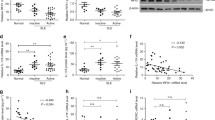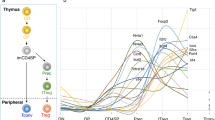Abstract
Epigenetic modifications have been shown to be important for immune cell differentiation by regulating gene transcription. However, the role and mechanism of histone methylation in the development and differentiation of iNKT cells in rheumatoid arthritis (RA) mice have yet to be deciphered. The DBA/1 mouse RA model was established by using a modified GPI mixed peptide. We demonstrated that total peripheral blood, thymus, and spleen iNKT cells in RA mice decreased significantly, while iNKT1 in the thymus and spleen was increased significantly. PLZF protein and PLZF mRNA levels were significantly decreased in thymus DP T cells, while T-bet protein and mRNA were significantly increased in thymus iNKT cells. We found a marked accumulation in H3K27me3 around the promoter regions of the signature gene Zbtb16 in RA mice thymus DP T cells, and an accumulation of H3K4me3 around the promoters of the Tbx21 gene in iNKT cells. The expression levels of UTX in the thymus of RA mice were significantly reduced. The changes in the above indicators were particularly significant in the progressive phase of inflammation (11 days after modeling) and the peak phase of inflammation (14 days after modeling) in RA mice. Developmental and differentiation defects of iNKT cells in RA mice were associated with abnormal methylation levels (H3K27me3 and H3K4me3) in the promoters of key genes Zbtb16 (encoding PLZF) and Tbx21 (encoding T-bet). Decreased UTX of thymus histone demethylase levels resulted in the accumulation of H3K27me3 modification.






Similar content being viewed by others
References
Bartova E, Krejci J, Harnicarova A et al (2008) Histone modifications and nuclear architecture: a review. J Histochem Cytochem 56:711–721. https://doi.org/10.1369/jhc.2008.951251
Beyaz S, Kim JH, Pinello L, Xifaras ME, Hu Y, Huang J, Kerenyi MA, Das PP, Barnitz RA, Herault A, Dogum R, Haining WN, Yilmaz ÖH, Passegue E, Yuan GC, Orkin SH, Winau F (2016) The histone demethylase UTX regulates the lineage-specific epigenetic program of invariant natural killer t cells. Nat Immunol 18:184–195. https://doi.org/10.1038/ni.3644
Boissier MC, Assier E, Falgarone G, Bessis N (2008) Shifting the imbalance from th1/th2 to th17/treg: the changing rheumatoid arthritis paradigm. Joint Bone Spine 75:373–375. https://doi.org/10.1016/j.jbspin.2008.04.005
Chen D, Liu H, Wang Y, Chen S, Liu J, Li W, Dou H, Hou W, Meng M (2019) Study of the adoptive immunotherapy on rheumatoid arthritis with Thymusderived invariant natural killer T cells. Int Immunopharmacol 67:427–440. https://doi.org/10.1016/j.intimp.2018.12.040
Cho YW, Hong T, Hong S, Guo H, Yu H, Kim D, Guszczynski T, Dressler GR, Copeland TD, Kalkum M, Ge K (2007) Ptip associates with mll3- and mll4-containing histone h3 lysine 4 methyltransferase complex. J Biol Chem 282:20395–20406. https://doi.org/10.1074/jbc.M701574200
Couture JF, Trievel RC (2006) Histone-modifying enzymes encryptingan enigmatic epigeneti code. Curropin Struct Biol 16:753–760. https://doi.org/10.1016/j.sbi.2006.10.002
Dashtsoodol N, Shigeura T, Aihara M (2017) Alternative pathway for the development of Va14+NKT cells directly from CD4-CD8-thymocytes that bypasses the CD4+CD8+stage. Nat Immunol 18:274–284. https://doi.org/10.1038/ni.3668
Gapin, & Laurent. (2016). Development of invariant natural killer t cells. Curr Opin Immunol, 39, 68-74. https://doi.org/10.1016/j.coi.2016.01.001
Horikoshi M, Goto D, Segawa S, Yoshiga Y, Iwanami K, Inoue A, Tanaka Y, Matsumoto I, Sumida T (2012) Activation of invariant nkt cells with glycolipid ligand α-galactosylceramide ameliorates glucose-6-phosphate isomerase peptide-induced arthritis. PLoS One 7:e51215. https://doi.org/10.1371/journal.pone.0051215
Issaeva I, Zonis Y, Rozovskaia T, Orlovsky K, Croce CM, Nakamura T, Mazo A, Eisenbach L, Canaani E (2007) Knockdown of alr (mll2) reveals alr target genes and leads to alterations in cell adhesion and growth. Mol Cell Biol 27:1889–1903. https://doi.org/10.1128/MCB.01506-06
Krovi SH, Gapin L (2017) iNKT cells need UTX-TRA demethylation. Nat Immunol 18:148–150. https://doi.org/10.1038/ni.3663
Kwon DI, Lee YJ (2017) Lineage differentiation program of invariant natural killer T cells. Immune Network 17:365–377. https://doi.org/10.4110/in.2017.17.6.365
Matsuda JL, Zhang Q, Ndonye R et al (2006) T-bet concomitantly controls migration, survival and effector functions during the development of v 14i NKT cells. Blood 107:2797–2805. https://doi.org/10.1182/blood-2005-08-3103
Meng M, Chen D, Xu M et al (2015) Study of the correlation between the percentage of iNKT cells and the ratio of IFN-γ/IL-4 in patients with rheumatoid arthritis. Microbiol Immunol 6:423–429. https://doi.org/10.3892/ol.2017.7484
Ng SS, Yue WW, Oppermann U, Klose RJ (2009) Dynamic protein methylation in chromatin biology. Cell Mol Life Sci (CMLS) 66:407–422. https://doi.org/10.1007/s00018-008-8303-z
Northrup D, Yagi R, Cui K, Proctor WR, Wang C, Placek K, Pohl LR, Wang R, Ge K, Zhu J, Zhao K (2017) Histone demethylases UTX and jmjd3 are required for NKT cell development in mice. Cell Biosci 7:25–39. https://doi.org/10.1186/s13578-017-0152-8
Savage AK, Constantinides MG, Han J, Picard D, Martin E, Li B, Lantz O, Bendelac A (2008) The transcription factor PLZF directs the effector program of the NKT cell lineage. Immunity 29:391–403. https://doi.org/10.1016/j.immuni.2008.07.011
Schubert D, Maier B, Morawietz L, Krenn V, Kamradt T (2004) Immunization with glucose-6-phosphate isomerase induces T cell-dependent peripheral polyarthritis in genetically unaltered mice. J Immunol 172:4503–4509. https://doi.org/10.4049/jimmunol.172.7.4503
Seiler MP, Mathew R, Liszewski MK, Spooner CJ, Barr K, Meng F, Singh H, Bendelac A (2012) Elevated and sustained expression of the transcription factors egr1 and egr2 controls NKT lineage differentiation in response to TCR signaling. Nat Immunol 13:264–271. https://doi.org/10.1038/ni.2230
Tudhope SJ, Delwig AV, Falconer J et al (2010) Profound invariant natural killer T-cell deficiency in inflammatory arthritis. Ann Rheum Dis 69:1873–1879. https://doi.org/10.1136/ard.2009.125849
Véronique P, Chifflot H, Sibilia J, Muller S, Monneaux F (2010) Rituximab treatment overcomes reduction of regulatory iNKT cells in patients with rheumatoid arthritis. Clin Immunol 134:331–339. https://doi.org/10.1016/j.clim.2009.11.007
Wang D, Xia X, Weiss RE, Refetoff S, Yen PM (2010) Distinct and histone-specific modifications mediate positive versus negative transcriptional regulation of tshα promoter. PLoS One 5:e9853. https://doi.org/10.1371/journal.pone.0009853
Yi L, Li Z, Hu T, Liu J, Li N, Cao X, Liu S (2019) Intracellular HSP70L1 inhibits human dendritic cell maturation by promoting suppressive H3K27me3 and H2AK119Ub1 histone modifications. Cell Mol Immunol 11:1–10. https://doi.org/10.1038/s41423-018-0195-8
Yue X, Izcue A, Borggrefe T et al (2011) Essential role of mediator subunit med1 in invariant natural killer T-cell development. Proc Natl Acad Sci 108:17105–17110. https://doi.org/10.1073/pnas.1109095108
Zhang Q, Long H, Liao J et al (2011) Inhibited expression of hematopoietic progenitor kinase 1 associated with loss of jumonji domain containing 3 promoter binding contributes to autoimmunity in systemic lupus erythematosus. J Autoimmun 37:180–189. https://doi.org/10.1016/j.jaut.2011.09.006
Zhang X, Liu J, Yang F et al (2016) Immunization with mixed peptides derived from glucose-6-phosphate isomerase induces rheumatoid arthritis in DBA/1 mice. Chin J Pathophysiol 32:569–576. https://doi.org/10.3969/j.issn.1000-4718.2016.03.031
Acknowledgments
This work was supported by the National Natural Science Foundation of China (NSFC) (81771755), Colleges and University’s Science and Technology Key Research Project of Hebei Province (ZD2017009), the Animal Lab of Medical Experiment Center of Hebei University, and Key Laboratory of Pathogenesis mechanism and control of inflammatory-autoimmune diseases in Hebei Province.
Author information
Authors and Affiliations
Corresponding author
Ethics declarations
All experiments were approved by the Animal Welfare and Ethical Committee of Hebei University (approval number IACUC-2017009).
Conflict of interest
The authors declare that they have no conflict of interest.
Additional information
Publisher’s note
Springer Nature remains neutral with regard to jurisdictional claims in published maps and institutional affiliations.
Highlights
• The decrease of iNKT cells and the imbalance of subsets in RA are related to the abnormal development and differentiation of iNKT.
• Developmental and differentiation defects of iNKT cells in RA mice were associated with abnormal methylation levels of key genes Zbtb16 and Tbx21 promoters H3K27me3 and H3K4me3.
• Decreased UTX of thymus histone demethylase resulted in the accumulation of H3K27me3 modification.
Rights and permissions
About this article
Cite this article
Meng, M., Liu, H., Chen, S. et al. Methylation of H3K27 and H3K4 in key gene promoter regions of thymus in RA mice is involved in the abnormal development and differentiation of iNKT cells. Immunogenetics 71, 489–499 (2019). https://doi.org/10.1007/s00251-019-01124-x
Received:
Accepted:
Published:
Issue Date:
DOI: https://doi.org/10.1007/s00251-019-01124-x




